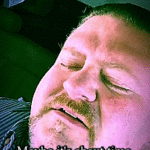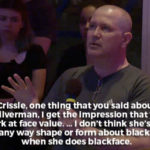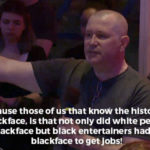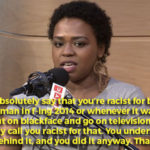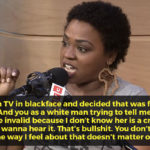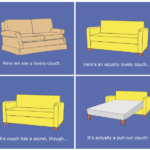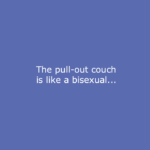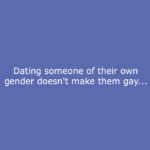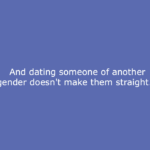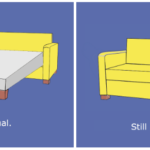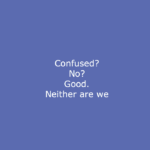but like neurotypicals need to get it through their heads that people with personality disorders can be abused much differently than them. Repeatedly and purposefully ignoring borderline people is abuse. Taking advantage of the trust of dependent people and leaving them on their own to "test them” is abuse. Little things they may not consider being abuse may actually BE abuse to those people. So like stop pretending that what we call abuse “isn’t legitimate” just because it’s not in your neurotypical standards of what is and isn’t abuse.
educate yourself
if you’re still unlearning internalized problematic shit clap your hands
(via Micropolis: Funny or Racist?)
In which a white man tries to explain blackface to crissle and she goes all the way off. See her read in all it’s glory at 1:19:00
a real friend picks screenshots that you look good in.
I need to write this WHOLE response down on an index card, carry it around with me to read it at any quiet moment, and memorize every single word so I can regurgitate it’s perfection ad nauseum during every fucked up conversation I have about racism.
Fashion is one of the very few forms of expression in which women have more freedom than men. And I don’t think it’s an accident that it’s typically seen as shallow, trivial, and vain. It is the height of irony that women are valued for our looks, encouraged to make ourselves beautiful and ornamental… and are then derided as shallow and vain for doing so. And it’s a subtle but definite form of sexism to take one of the few forms of expression where women have more freedom, and treat it as a form of expression that’s inherently superficial and trivial. Like it or not, fashion and style are primarily a women’s art form. And I think it gets treated as trivial because women get treated as trivial.
I feel like this about lingerie and specifically the value people place on lingerie (which is very often women’s work). The devaluation of things associated with women and women’s labor is reified in garments that are almost exclusively seen on women’s bodies. There’s this overwhelming sense that the labor associated with sewing, say, a bra is valueless, and that the laborer should be willing to work for free…or at least for inhumanely cheap wages. Culturally, I think this devaluation also ties into a lot of other things (for example, in America, puritanical Protestantism and its suspicions of the body, and, globally, the taken-for-granted exploitation of people of color), but I’ve just been idly pondering the way lingerie links up with many other conversations. And that’s not even getting into all the other expectations surrounding lingerie and how women are penalized for not conforming. Lift your breasts, but don’t wear push-ups. Wear underwear, but make sure it’s invisible. And so forth and so on. (I’m on my phone, by the way. Please pardon any typos.)
It’s been a while since I’ve introduced myself and there are a lot of new faces around here; Hi, I’m Heart.
I like bunnies, happy porn and cake.
I’m a queer, kinky feminist and I’m married to my best friend, we’re madly in love and we’re ethically non-monogamous. We made a decision many years ago to encourage each other to live our lives to the fullest and never settle for less than our hearts desire. I like to write about our smutty exploits, the challenges of fearless communication and my feeeeeeeelings. I also like to take pictures of my butt.
I have an adorable submissive named Kitten, who I love to spoil and smooch. And my husband and I have regular play dates with Rumi, our self-titled dude-icorn. I’m a very lucky girl.
Thanks to this blog I’ve had the opportunity to travel, collaborate, visit, meet, connect and make lifelong friends with so many people across the globe who are equally passionate about loving without boundaries squeezing all they can out of this life.
I’m currently working on a few exciting projects that I can’t wait to share with you, until then you can stay connected here:
If you’re not following this woman, you’re wrong. You’re wrong, and you know you’re wrong.
everyone has said and done problematic things in their lifetime. that’s a result of the society we live in, not necessarily a reflection of their character.
what is a reflection of their character is how they react to being informed of the negativity within their behavior and statements, and whether or not they choose to change their behavior.
The Dark Side of Body Positivity: Body Snark in the Lingerie Blogging Community
LinkThe Dark Side of Body Positivity: Body Snark in the Lingerie Blogging Community
We live in a world where being body positive means starting your statement with “I love plus size women, but…” and then making whatever fat phobic statement you were going to make anyway. These bloggers are generally in their early 20’s, white and wear small sizes – but they’ve figured out that jumping on the the body positive train is the one that will help them get more readers. This frequently leaves me frustrated on both a personal and professional level. When I have a client who wants to work with bloggers to advertise a body positive product, do I send them to bloggers I know are making nasty comments about plus size women behind the scenes? Or do I tactfully steer them elsewhere, to bloggers with sincere attitudes but generally smaller numbers? I struggle with the nasty hidden side of lingerie blogging on a weekly basis due to my job and I don’t have an answer yet.
I feel like a lot of Body Positivity–and I’m definitely including myself in this–is actually championing fat women, or dark-skinned women, or disabled women for obtaining beauty in spite of their “flaw.” So the message isn’t “Fat women are beautiful!” but “Look how these women overcame fatness to be beautiful!”
It’s difficult for support of other women to feel sincere–no matter how much you truly admire them–when you hate your own body. Actions speak louder than words. Any talk of how gorgeous Amber Riley is (and she is) rings hollow when loudly lamenting how disgusting one’s own smaller body is. I’m guilty of this. And I suspect I’m not the only one.
We’re getting hit by (and harming others with) shrapnel from bullets not aimed at us. I haven’t endured direct insults about my skin tone since fourth grade (save for Twitter), but the women in my old neighborhood–only slightly lighter than I am–refusing to go anywhere in the summer without giant black umbrellas and linen wraps in tow made me feel bad. Would any of those women have ever called me ugly? I highly doubt it. But they certainly made it clear that they would hate for their skin to look like mine. So what messages do my insults about my body shape send?
I feel like we can only solve this problem by loving what we see in the mirror. But that seems like an impossible task for myself and so many other women. But at the very least we can fake it until we make it and stop insulting ourselves publicly. If we can’t do it for ourselves then at least we can do it to stop insulting others by proxy.
Get your fresh, unedited hot takes right here, folks!
Hi y’all!
I’ve compiled a list of readings that speak to issues of nationalism, indigeneity, colonialism, and resistance/decolonization
The list is of course limited to what readings I’ve encountered at some point. They also come from a variety of academic disciplines and political movements (settler colonial studies, native studies, queer theory, postcolonial studies, feminist studies, trans studies).
And, with a few exceptions, these files were legally uploaded and shared… a lot of the time by the authors themselves, which I feel the need to point out because I love when authors can/do share their work online for free. (I say this not because I’m worried about the sanctity of ‘intellectual property’ but because I’m worried about things being deleted.)
Also re-linking to this list of pdf readings, “Natives Read Too,” from The Yáadihla Girls!
human rights/war/nationalism/sovereignty
- “What Do Human Rights Do?” by Talal Asad
- “On Torture: Abu Ghraib by Jasbir Puar
- “From Cold War to Trade War: Neocolonialism and Human
Rights“ by Susan Koshy- “Necropolitics” by Achile Mbembe
- “Algeria Unveiled“ by Frantz Fanon
- A Dying Colonialism by Frantz Fanon
- History and Imperialism: A Century of Theory, from Marx to Postmodernism by Patrick Wolfe
- Who Sings the Nation-State? Judith Butler and Gayatri Spivak
- “Where Lawlessness is the Law: The Settler Colonial Frontier as a Legal Space of Violence” by Julie Evans
- “1492: a New World View“ by Sylvia Wynter
- Frames of War by Judith Butler
- “Purchase by Other Means: The Palestine Nakba and Zionism’s Conquest of Economics” by Patrick Wolfe
- Manifesting America: The Imperial Construction of U.S. National Space by Mark Rifkin
transnational/native/postcolonial feminisms & feminist critiques:
- Woman, Native, Other: Writing Postcoloniality and Feminism – Trinh T. Minh-Ha
- “Lynching, Empire, and Sexuality in Black Feminist Theory“ -Hazel V. Carby
- “Transnational Feminist Pedagogy: An Interview with Inderpal Grewal and Caren Kaplan”
- “Under Western Eyes: Feminist Scholarship and Colonial Discourses” by Chandra Talpade Mohanty
- “Feminist Problematizations of Rights Language“ by Jasbir Puar and Isabelle Barker
- Feminist Genealogies, Colonial Legacies, Democratic Futures by M. Jacqui Alexander & Chandra Talpade Mohanty
- “The Subject of Freedom” by Saba Mahmood
- The Spivak Reader
- Borderlands/La Frontera by Gloria Anzaldúa
- “Colonialism, Nationalism, and Colonialized Women: The Contest in India“ by Partha Chatterjee
- “Can the Subaltern Speak?” Gayatri Spivak
- The Politics of the Veil – Joan W. Scott
- “Decolonizing Feminism: Challenging Connections between Settler Colonialism and Heteropatriarchy“ by Maile Arvin, Eve Tuck, and Angie Morrill
- “Native American Feminism, Sovereignty, and Social Change” by Andrea Smith
decolonization, art, and resistance (not necessarily feminist):
- Edward Said and Critical Decolonization
- Culture and Resistance: Conversations with Edward W. Said
- “Decolonization is not a Metaphor“ by Eve Tuck and K. Wayne Yang
- “Decolonizing Antiracism” by Bonita Lawrence and Enakshi Dua
- Bury My Art at Wounded Knee / R.I.S.E
- The Boarding School Healing Project
- Center for Third World Organizing
- Queers Against Israeli Apartheid
queer theory/sexuality studies/native studies/trans studies
- Imperial Leather: Race, Gender, and Sexuality in the Colonial Contest by Anne McClintock
- “Homonationalism As Assemblage: Viral Travels, Affective Sexualities“ by Jasbir Puar*
- Conquest: Sexual Violence and American Indian Genocide by Andrea Smith
- “Un-settling Settler Desires” by Scott Morgensen
Also the Unsettling America wordpress.- Race and the Education of Desire: Foucault’s History of Sexuality and the Colonial Order of Things – Ann Laura Stoler
- “Romancing the Transgender Native: Rethinking the Use of the ‘Third Gender’ Concept“ by Evan B. Towle and Lynn Morgan
- “Transing and Transpassing Across Sex-Gender Walls in Iran.” by Afsaneh Najmabadi
- “Queer Settler Colonialism in Canada and Israel: Articulating Two-Spirit and Palestinian Queer Critiques“ by Scott Lauria Morgensen
- “Queer Theory and Native Studies: The Heteronormativity of Settler Colonialism” by Andrea Smith
*Actually just going to link to this page of Dr. Puar’s work because it’s great and relevant (and she also has a lot of work on Israel/Palestine).
critiques of humanitarianism/developmentalism:
- “Stealing the Pain of Others: Reflecting on Canadian Humanitarian Responses“ by Sherene H. Razack
- “The Rationality of Empowerment: Microcredit, Accumulation by Dispossession, and the Gendered Economy” by Christine Keating, Claire Rasmussen, and Pooja Rish
- “Reflections on Violence, Law, and Humanitarianism“ by Talal Asad
- “How to Write about Africa” by Binyavanga Wainaina
- “Militarized Humanitarianism Meets Carceral Feminism: The Politics of Sex, Rights, and Freedom in Contemporary Antitrafficking Campaigns“ by Elizabeth Bernstein
- “Coca-Cola, Labor Restructuring and Political Violence in Colombia” Lesley Gill
[Really wish I knew more about this kind of work.]
Biopolitics, science, environmental justice
- “Peversity, Contamination, and the Dangers of Queer Domesticity“ -Nayan Shah
- “Your DNA Is Our History:’ Genomics, Anthropology, and the Construction of Whiteness as Property” by Jenny Reardon and Kim TallBear
- “Displaying Sara Baartman“ by Sadiah Qureshi
- “The Biopolitics of Settler Colonialism: Right Here, Right Now” by Scott Morgensen
- “Black Bodies, White Science“ -Brian Wallis
- The Violence of Green Revolution: Third World Agriculture, Ecology and Politics by Vandana Shiva
- “The Seed and the Earth” by Vandana Shiva
- “Earth Democracy: An Interview with Vandana Shiva”
- “Putting knowledge in its place: science, colonialism, and the postcolonial“ by Suman Seth
and…. U.S. politics
- “Workfare–Warfare: Neoliberalism, ‘Active’ Welfare and the New American Way of War” by Julie MacLeavy and Columba Peoples
- “Women and Chile at the Alamo: Feeding U.S. Colonial Mythology“ by Suzanne Bost
- “The People of California are Suffering’: The Ideology of White Injury in Discourses of Immigration” by Lisa Marie Cacho
- “American Studies without America: Native Feminisms and the Nation-State“ by Andrea Smith





